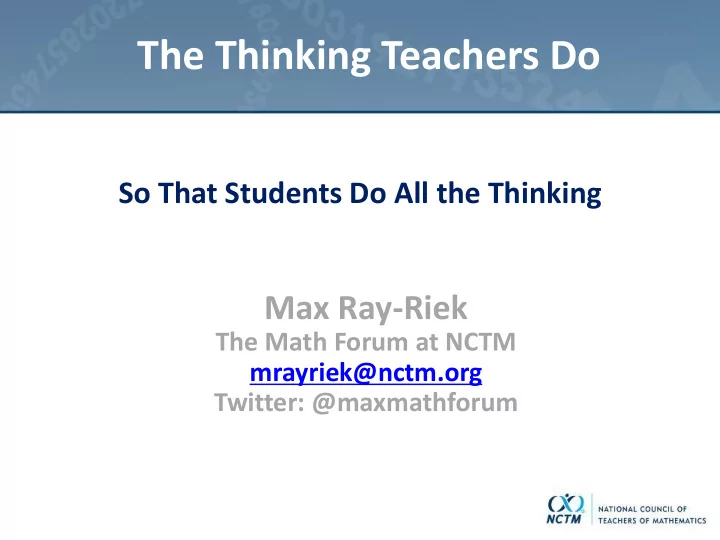

The Thinking Teachers Do So That Students Do All the Thinking Max Ray-Riek The Math Forum at NCTM mrayriek@nctm.org Twitter: @maxmathforum
Teaching Practices • Implement tasks that promote reasoning and problem solving • Use and connect mathematical representations • Build procedural fluency from conceptual understanding • Support productive struggle in learning mathematics • Elicit and use evidence of student thinking 2
More Teaching Practices • Students and teachers facilitate meaningful mathematical discourse • Students and teachers pose purposeful questions • Students use and connect mathematical representations • Students build procedural fluency from conceptual understanding 3
How do my students next year get to do the same thinking that I got to do here? 4
Whole-Group Discussions About Student Work on Rich Tasks Intentional Talk by Elham Kazemi & Allison Hintz Stenhouse Publishers, 2014 5
4 Principles from Intentional Talk 1. Discussions should achieve a mathematical goal 2. Students need to know what and how to share 3. Teachers need to orient students to one another and the mathematical ideas 4. Teachers must communicate that all students are sense makers and that their ideas are valued 6
Plan 1. Analyze a problem together 2. Anticipate student strategies together 3. Look at student work in groups of 3 4. Fill out an Intentional Talk planning template 5. Reflect on planning for students to make connections and engage in discourse 6. Make a plan to take this back to your schools 7
The Kickball Tournament [Problem #3943] Ms. Emery is a physical education teacher. She wants to organize a kickball tournament for the fourth graders in her school. She will divide the fourth grade into 6 equal kickball teams. Ms. Madden's fourth grade class has 20 students, Mr. Smoyer's fourth grade class has 23 students and Ms. Ponzio's fourth grade class has 29 students. 8
Noticing and Wondering I Notice I Wonder 9
Anticipating… Kickball problem Work with a group of 2-3 at your table to fill out the “Anticipating” parts 10
Looking at Student Work • Look through the student work • Scissors, highlighters, and sticky notes are available • Use it to fill out the rest of the Open Strategy Sharing planning template • If you prefer, choose a different template and plan a different conversation: – Compare and Connect – Define and Clarify – Why? Let’s Justify – Troubleshoot and Revise – What’s Best and Why? 11
Share At Your Table • Take turns sharing with other table groups • After each person shares tell: – One thing you noticed and valued in their work – One thing you are wondering about their work 12
Pause and Reflect Jot down your thoughts about: 1. Our focus question was: How do my students next year get to do the same thinking that I got to do here? What are your thoughts on that question now? 2. What is the value of using specific students’ work as you plan your lessons? 13
Mingle! • Stand up and move around. • Find someone and introduce yourself. • Ask them one question from the reflection. • Listen to their answer. • Move on to find another person. • No back and forth, just ask one question and listen to the answer. • When I raise my hand, finish your conversation and raise your hand. 14
Make a Plan • What happened in this session that you want teachers at your school to do? • What is your plan for how they could make this work as useful as possible? • What would it take to make that plan happen? 15
Disclaimer The National Council of Teachers of Mathematics is a public voice of mathematics education, providing vision, leadership, and professional development to support teachers in ensuring equitable mathematics learning of the highest quality for all students. NCTM ’ s Institutes, an official professional development offering of the National Council of Teachers of Mathematics, supports the improvement of pre-K-6 mathematics education by serving as a resource for teachers so as to provide more and better mathematics for all students. It is a forum for the exchange of mathematics ideas, activities, and pedagogical strategies, and for sharing and interpreting research. The Institutes presented by the Council present a variety of viewpoints. The views expressed or implied in the Institutes, unless otherwise noted, should not be interpreted as official positions of the Council. 16
17
Recommend
More recommend